By RP Staff, on Mon May 30, 2011 at 12:30 PM ET ![RickyFitts[1]](http://therecoveringpolitician.com/wp-content/uploads/2011/05/RickyFitts1-231x300.jpg) Ricky Fitts I was born second in line behind my older brother, Ricky. He was 3 and 1/2 years older than me.
Early on, sibling rivalry developed between us. I always wanted to tag along with Ricky and his friends but being as much younger as I was, they didn’t want me around.
At one point, Ricky and his friends formed a Yankees fan club. I really wanted to be part of it only to once again be denied. That year, the Yankees played the Pittsburgh Pirates in the World Series. Since I couldn’t be in the Yankees fan club, I rooted for the Pirates. The Pirates won the series and I became a fan for many years.
Ricky went away to a Catholic seminary for his first two years of high school. In spite of our sibling rivalry, I found myself missing him at times. When he came home, though, the sibling rivalry resumed. As I had developed my own circle of age appropriate friends, the intensity of the rivalry was far less.
When I started my first year at Catholic high school seminary in Missouri, Ricky was in his senior year at local Catholic high school in Louisville. I was homesick at times.
With the Thanksgiving holiday coming up and many of the local St. Louis area boys going home to be with their families, the homesickness was particularly intense. Ricky took the Greyhound and came to visit me over that weekend. His visit meant the world to me. The bitterness of the sibling rivalry was completely dissolved over that weekend.
After graduating from high school, Ricky began a job as a union sheet metal
worker. The Vietnam War was going full tilt by then. Ricky, being the young patriotic man that he was, felt very strongly that he needed to serve his country. In the fall of 1967, he enlisted in the Marine Corps. The following spring, he came home to Louisville before shipping out to Vietnam. I had to get special permission to leave the seminary to visit home before Ricky left. The time of the visit flew by and Ricky took me back to airport to fly back to St. Louis. He walked with me to the tarmac. As I reached the top of the stairs to the plane, I turned to wave goodbye to him.
Our eyes locked and I immediately knew that I would not see him again. I
remember going to my seat with tears in my eyes and a stewardess asking me if I was okay. “Yes,” I said “I just said goodbye to my brother who’s going to Vietnam.” I didn’t tell her what provoked the tears.
On June 15th , 1968, just 10 days after the assassination of Robert Kennedy, one of Ricky’s heroes, Ricky was killed in action in Quan Tri Province, Vietnam. It was the day before my 16th birthday. On Tuesday, June 18th, I was standing on our front porch with some friends when the Marine Corps car pulled into the driveway. My heart sank and there was a pain in the pit my stomach. I knew why they had come and that our lives were never going to be the same.
By RP Staff, on Mon May 30, 2011 at 12:00 PM ET 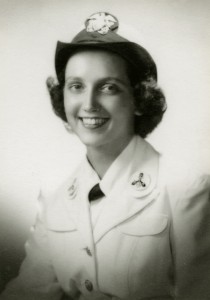 Lois Gray My mother, Lois Howard was a lieutenant jg in the Navy. She was stationed in Washington in the Office of Naval Intelligence.
One of my mother’s favorite stories was of walking back from night duty almost at sunrise in Washington, where she sometimes ran into President Harry Truman, who was out on his morning walk. Mother reported that Truman would greet her with a salute, saying, “Good morning, Lieutenant!” This was before the assassination attempt on Truman’s life, when he was accompanied by only one or two bodyguards.
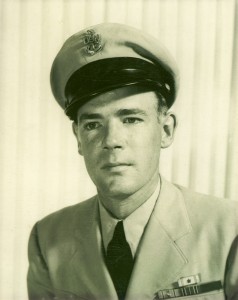 My father, James Norris Gray (1917-1972) was a chief petty officer, and spent his tour of duty in the Pacific on a PT boat, and in China. My father, James Norris Gray (1917-1972) was a chief petty officer, and spent his tour of duty in the Pacific on a PT boat, and in China.
Editor’s Note: The author, Jim Gray, is the Mayor of Lexington, Kentucky.
By RP Staff, on Mon May 30, 2011 at 11:30 AM ET My late mother in law, Eva Maurice Schweder, was one of the first one hundred women in the Navy in WWII. She became the first aeronautical draftswoman. She survived the war to come home and complete college, marry and raise three sons following her honorable discharge. The entire family is very proud of her service to her country.
By RP Staff, on Mon May 30, 2011 at 11:00 AM ET
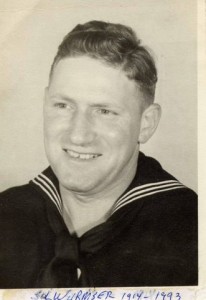 My brother Sol served in the Navy aboard the destroyer Stoddard, DD566. The Stoddard was actively engaged in many of the Naval battles in the Pacific. My brother Sol served in the Navy aboard the destroyer Stoddard, DD566. The Stoddard was actively engaged in many of the Naval battles in the Pacific.
His most hair-raising story was of his battle station, and how scary it was to be in the “handling room” during a fire fight. For the uninitiated, the “handling room” on a destroyer is an area in the bottom of the ship where all the black powder is stored. The bulkhead (door) is “battened down”; you’re locked in there, and the job of the crew there is to keep sending bags of black powder up the elevator to the gunners topside.
Sol, (1914-1994), left Louisville in 1936 during the height of the Depression, taking a job in Los Angeles, and finally ending up in Chicago. There he met his future wife, Bertha Goodhart. He was already a father at the time he was drafted, in 1943. After the War, he returned to Chicago where he rejoined his two brother-in-laws in their Goodhart Family business.
The other members of my family that served during this time were my cousin Monroe, who was a sgt. in the signal corps; and my brother-in-law Moby Blanc, husband of my sister Sylvia. He was called up in the very first draft.
At this time, the song “Good Bye Dear, I’ll Be Back in a Year,” was very popular. But alas, before that year was up, war was declared, and those early draftees served much longer than the rest of us. Moby rose to the rank of Captain, and did his tour of duty in North Africa.
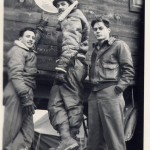 Also among the many that I’m remembering today are those men that I served with during WWII (I carry a list of their names in my wallet). At right is a photograph of Edmund Wright, Jack Yowell and “Smitty”. These three pilots were each shot down; Yowell and Smitty were killed in action, and Wright became a prisoner of war after parachuting over Germany. In the photo they are standing by the trailer where we received mission briefings. Also among the many that I’m remembering today are those men that I served with during WWII (I carry a list of their names in my wallet). At right is a photograph of Edmund Wright, Jack Yowell and “Smitty”. These three pilots were each shot down; Yowell and Smitty were killed in action, and Wright became a prisoner of war after parachuting over Germany. In the photo they are standing by the trailer where we received mission briefings.
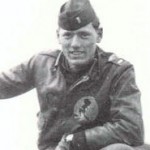 Editor’s Note: The author, Jerry Wurmser, is one of the RP’s true heroes. Jerry flew 66 fighter-bomber missions over Europe during the final years of World War II. His earlier claim to fame is that he almost broke the sound barrier on June 9, 1944, at 6:05 p.m. over Salisbury, Maryland, and lived to tell about it. At 88 years young, he remains an active member of Lexington’s Jewish community, as well as a doting grandfather and great-grandfather. Editor’s Note: The author, Jerry Wurmser, is one of the RP’s true heroes. Jerry flew 66 fighter-bomber missions over Europe during the final years of World War II. His earlier claim to fame is that he almost broke the sound barrier on June 9, 1944, at 6:05 p.m. over Salisbury, Maryland, and lived to tell about it. At 88 years young, he remains an active member of Lexington’s Jewish community, as well as a doting grandfather and great-grandfather.
By John Johnson, on Mon May 30, 2011 at 10:30 AM ET 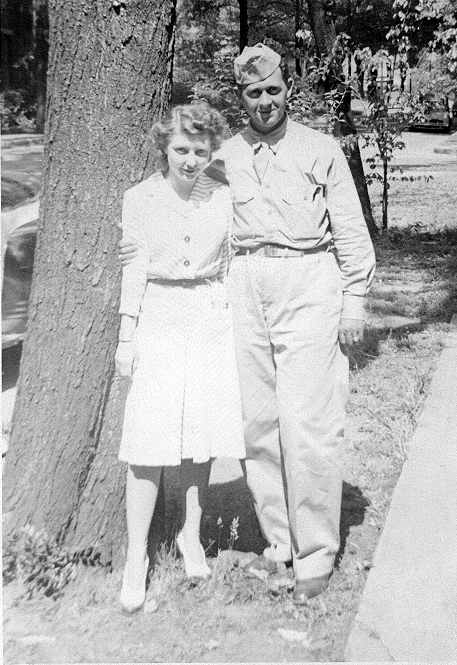 Both of my grandfathers served in the military, and yet the roles they played in my life were very different. My Mom’s father, Thomas Carmine Capone (seen with my grandmother Mary) died many years before I was born. All I know of him was from my mother (and even her memories are less pronounced given he died when she was only 13). Both of my grandfathers served in the military, and yet the roles they played in my life were very different. My Mom’s father, Thomas Carmine Capone (seen with my grandmother Mary) died many years before I was born. All I know of him was from my mother (and even her memories are less pronounced given he died when she was only 13).
I think though when I summarize his service, I think of a story that after he died, he was buried in a military cemetery in New York. On his tombstone was the letters “BSM” which no one knew what they meant. It turned out my grandfather had been awarded a Bronze Star Medal for operations in Europe during the War.
No one knew if he ever knew or not, but it wouldn’t surprise me if he was just too humble to have ever told any family about it.
 My other grandfather, John H. Johnson Jr., is my namesake (seen with my grandmother Jennie). I knew my grandfather very well—having been so lucky to have him as a part of my life for the first 36 years of my life. I didn’t think of my grandfather of a military man, but I do think of him as someone with an incredible work ethic and incredibly high standards. I have no doubt his demanding standards were shaped by his experiences earlier in life and in service to our country. My other grandfather, John H. Johnson Jr., is my namesake (seen with my grandmother Jennie). I knew my grandfather very well—having been so lucky to have him as a part of my life for the first 36 years of my life. I didn’t think of my grandfather of a military man, but I do think of him as someone with an incredible work ethic and incredibly high standards. I have no doubt his demanding standards were shaped by his experiences earlier in life and in service to our country.
The greatest compliment I was ever given was from my uncle, who once told me that if my grandfather could have drawn up the plan for what he wanted his grandson to be like, it would have been me. Sharing someone’s name creates a special bond—and in some sense, a special sense of responsibility.
On this Memorial Day, I’d like to recognize both of my grandfathers and all the other veterans who have served our country proudly.
By RP Staff, on Mon May 30, 2011 at 10:00 AM ET Charles Mitchell “Charlie” Frost Jr. SFC (Ret), 77, of Radcliff, KY, passed away Sunday, January 24, 2010 at Hardin Memorial Hospital in Elizabethtown, KY.
Charles Frost Jr. often arrived at local veterans events in a 1942 Army Jeep. He also would wear his old uniform, which he will be buried in. He was 77.
“Wherever there was something that paid a tribute or an honor to soldiers, he was there,” former state Rep. Mike Weaver said.
Frost joined the Army at age 15, and two years later was sent to battle in Korea. Serving in the 34th Infantry Regimen, 24th Division, he and his fellow GIs were ambushed several times; Frost was the lone survivor of at least two of these attacks.
After he was captured, a North Korean officer — nicknamed “The Tiger” because he was so harsh — forced him and other Americans to march 126 miles to a Chinese prison camp. The temperature at times dropped to 20 below zero.
“It just took an extremely strong person to survive that,” said Weaver, a retired Army colonel.
Only 212 out of 850 GIs survived the march. Some froze or starved to death — or died from disease. Others were shot for leaving formation. Frost — a prisoner of war from 1950 until 1953 — was bayoneted twice in the leg. He also lost a kidney because of malnutrition, according to Weaver.
Fifty years later, with Weaver’s help, he was awarded the Purple Heart medal.
Here is an interview I conducted with Frost in 2005:
Charlie Frost An American Hero from James Pence on Vimeo.
By Paul Hodes, on Mon May 30, 2011 at 9:30 AM ET 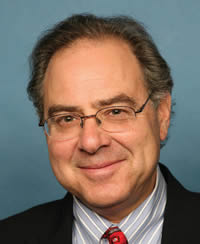 As a member of congress, It was both obligatory and an honor to attend Memorial Day celebrations in my district. As a member of congress, It was both obligatory and an honor to attend Memorial Day celebrations in my district.
In New Hampshire, we have a beautiful Veteran’s cemetary and events are well attended. Often sitting in bright sunshine, sometimes in a late spring cloudy chill under a blanket, the World War II veterans who were residents at the nearby Veterans Home were always given front row seats. Many were in wheelchairs, some required constant attendance. Some came in uniform and some just came.
Having never experienced the horror of war myself, I sometimes struggled to convey my deep gratitude to thank those who served and died for their country. At first, it was intimidating to be in the company of so many former and present military personnel.
I later became comfortable with my role and theirs. I always tried to say something different and meaningful, something that went beyond the ritualistic expressions of gratitude. After a time, I came to appreciate the rituals and the importance of the repetition of those ritualistic expressions. But, here’s something I never talked about and I don’t know why.
I was named for a distant cousin. When I was a child my grandparents told me that Paul was a sweet, brilliant, handsome man destined for greatness. He died during World War II flying a combat mission. I carry his name and his legacy. He died in service to his country as did so many others.
So, on this Memorial Day, I am honored to remember him and thank him for his service and his sacrifice.
Cousin Paul, I thank you for your life, your service and your name. My own service, of a different kind, is the living proof that you did not die in vain. This great country with all its greatness and its flaws, endures thanks to you.
By RP Staff, on Mon May 30, 2011 at 9:00 AM ET 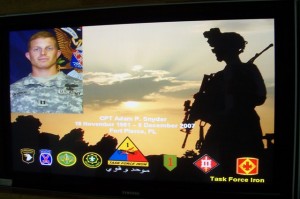 During most of 2008 and early 2009, I had the privilege to serve our country in Northern Iraq as a mobilized US Army Reservist. But, these thoughts are not about me, but rather CPT Adam Snyder, who paid the ultimate sacrifice in service to our nation. During most of 2008 and early 2009, I had the privilege to serve our country in Northern Iraq as a mobilized US Army Reservist. But, these thoughts are not about me, but rather CPT Adam Snyder, who paid the ultimate sacrifice in service to our nation.
You see, in my civilian job, I serve as the Director of Volunteer Services at Central Baptist Hospital in Lexington, KY. When I learned in November 2007 of my pending deployment, one of our volunteers mentioned that his nephew, Adam Snyder, was stationed only about 20 miles from where I would soon find myself. This volunteer expressed his hope that Adam and I might meet during our time of mutual deployment. Understandably, this volunteer expressed a very high opinion of his nephew who had graduated from the US Military Academy at West Point only a few years earlier.
Unfortunately, just before I left for my deployment, on the day we held our Volunteer Christmas Luncheon at the hospital in December of 2007, the volunteer received word that the vehicle in which Adam had been traveling had been hit by an Improvised Explosive Devise (IED) and Adam’s chances for survival were slim. Adam did not survive that attack.
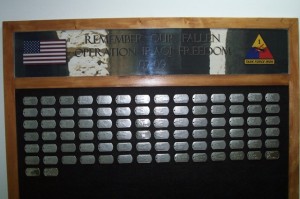 Because the brigade and division headquarters in which Adam served was located near where I was in Iraq, upon my arrival, I had an opportunity to “meet” Adam and pay my respects in the land where Adam last was on this earth. Unfortunately, at that time, there were quite a few others who had lost their lives and a memorial was erected to those soldiers that all could see upon entering the headquarters building. An artistic soldier captured well the emotions experienced by soldiers who have lost a comrade through his painting on the wall by the fallen soldier memorial. You can see in the photo, “dog tags” with the name of each soldier who had lost his life are hanging on the weapon. On the wall, the ID tags were also respectfully displayed on the wall near the entry. And, no one could enter the headquarters without viewing the perpetually running PowerPoint remembering each fallen soldier. Because the brigade and division headquarters in which Adam served was located near where I was in Iraq, upon my arrival, I had an opportunity to “meet” Adam and pay my respects in the land where Adam last was on this earth. Unfortunately, at that time, there were quite a few others who had lost their lives and a memorial was erected to those soldiers that all could see upon entering the headquarters building. An artistic soldier captured well the emotions experienced by soldiers who have lost a comrade through his painting on the wall by the fallen soldier memorial. You can see in the photo, “dog tags” with the name of each soldier who had lost his life are hanging on the weapon. On the wall, the ID tags were also respectfully displayed on the wall near the entry. And, no one could enter the headquarters without viewing the perpetually running PowerPoint remembering each fallen soldier.
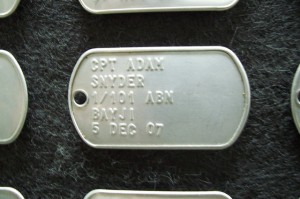 It was during a Memorial Day Service on May 26, 2008, while serving in Iraq during which I discovered the depth of my appreciation and respect for Adam and the many others who have paid the ultimate sacrifice in service. I was overwhelmed with a sense of responsibility to continue carrying the torch of freedom – because of the men and women who had gone before and on whose shoulders I stand. It was during a Memorial Day Service on May 26, 2008, while serving in Iraq during which I discovered the depth of my appreciation and respect for Adam and the many others who have paid the ultimate sacrifice in service. I was overwhelmed with a sense of responsibility to continue carrying the torch of freedom – because of the men and women who had gone before and on whose shoulders I stand.
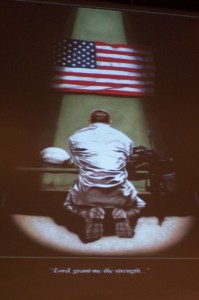 The photo to the right was displayed during this Memorial Day Service in Iraq during which Adam’s name was called – along with so many others. The words underneath the image say, “Lord, grant me the strength …” This image and phrase so accurately captures how I felt each day of service while there. And, I’m confident it is how many, many others have felt during their time of service – wherever that might be. The photo to the right was displayed during this Memorial Day Service in Iraq during which Adam’s name was called – along with so many others. The words underneath the image say, “Lord, grant me the strength …” This image and phrase so accurately captures how I felt each day of service while there. And, I’m confident it is how many, many others have felt during their time of service – wherever that might be.
Now, as I prepare for Memorial Day this year, and every year, I thank God for Adam and all the other brave men and women who have selflessly served our nation, those who continue to serve, and those who will elect to assume the mantle of service in the future.
By Jonathan Miller, on Mon May 30, 2011 at 8:30 AM ET If you’re at home catching up on work, or at the pool catching some rays, I encourage you to check in via your desktop or PDA every so often to The Recovering Politician. We are here to put the “Memorial” back into Memorial Day.
Too often, the special message of this important American holiday gets lost in the three-day-weekend vacations, department store sales, and swimming pool openings. This is the one day every year where it is incumbent on all of us to remember the brave men and women who served our country in uniform.
Because they remembered us. As the Scripture instructs, the greatest love is shown by those who sacrifice their own lives for the benefit of their neighbors.
On Friday, I invited our readers to join our contributing RPs in offering tributes to special people in their lives who served our country. And the overwhelming response was truly heartwarming.
Beginning at 9:00 AM EDT, and every half hour that follows, we will share a new tribute from one of our readers or our regular contributors. You’ll hear from the sons and daughters, grandchildren, and siblings of true American heroes. You’ll hear from veterans themselves, including my own hero who was a decorated World War II fighter-pilot. You’ll even hear from a sitting mayor who took time out of his extraordinary busy schedule to salute his own mother and father.
If you never had a chance to submit your tribute, please take the opportunity in the comments section below each post. Feel free to honor a beloved friend or family member, or perhaps an unknown, unheralded man and woman who lost his or her lives to preserve our freedoms.
Thanks for sharing this Memorial Day with us. I hope you enjoy it.
By RP Nation, on Wed May 18, 2011 at 8:30 AM ET 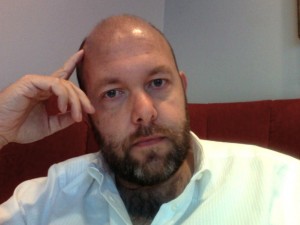 One One
I don’t remember the phone call that changed my life as much as I remember later that night watching my father staring into his coffee cup four months after the funeral, watching my sister watch me, and thinking how soupbeans and apple preserves and cornbread for dinner reminded me of my mother.
Two
The prop car was already on fire by the time I overheard the two redneck brothers we hired as “pyro technicians” arguing about whose job it was to remove the gas tank. From 100 feet, I could smell melting vinyl and kerosene, and I wondered if Harold, our cinematographer circling above in a rickety prop plane, would continue to film after we had all blown up. I hoped he would. It was the last shot of the movie, and we could only afford one shitty 1982 Chevy Monte Carlo to set on fire, so it was now or never. The morning sky was slate and purple, and I thought about running, really, but I was too tired.
Three
-I’m sorry. Cooper who?
-John Cooper, from the Sundance Film Festival. People call me Cooper.
-Oh. Okay. Right. Yeah.
– I wanted to call and tell you that we loved 100 Proof. Thanks for sending the film to us. We’d like to have it in the Festival this year.
– Wait. Who is…? I’m sorry. Do what?
-We would like to have 100 Proof play at the Sundance Film Festival. It’s in January. Think you can make it…?
Four
You try to order French fries every hour or so, drink fountain RC and pay for the refills. Play the jukebox. When you write in restaurants, you learn ways to pay your freight. Eventually, people forget you are there. At the Dairy Bar across the river in Beattyville, KY, they know you as “Donnie and Mayme’s boy from Lexington–down here writing something.” You sit at the booth, put your watch in your pocket. Wait for the little bird to come sit on your shoulder. At night, you drive the Booneville road, eat a sandwich, turn into the county roads. Listen to Keith Whitley, maybe Elvis Costello. You’ve never written a movie; but know the first scene, and the last. Forget the middle tonight. It’ll be waiting for you tomorrow.
Five
 New York City. Edie Falco rollerblades into the greek coffeeshop on 6th Avenue. She wants to talk about playing the lead. The Sopranos were still a few years away, and her agent didn’t want her to come, didn’t want her going to Kentucky for three months (why would you want to go to Kentucky…!?), didn’t want her playing a criminal, or taking a risk with a first-time filmmaker at this point in her career. So, before she even sits down: New York City. Edie Falco rollerblades into the greek coffeeshop on 6th Avenue. She wants to talk about playing the lead. The Sopranos were still a few years away, and her agent didn’t want her to come, didn’t want her going to Kentucky for three months (why would you want to go to Kentucky…!?), didn’t want her playing a criminal, or taking a risk with a first-time filmmaker at this point in her career. So, before she even sits down:
– Why would I want to play this woman with no redemption, so little forgiveness.
– I don’t know. Because you can give her some?
– But how far can we take that before people run out of the theater?
We. It was the word “we” that I thought about later. What date would the Welles/Hayworth, Cassavetes/Rowlands relationship start? Me, the troubled director–she, the brilliant actress. What would our next film be? Three weeks later, after her agent won out, Edie regretfully said no, but recommended a friend she called the “best smart actress in New York” (Pamela Stewart, and she was so very right). Edie and I traded letters for a while longer. She always made it a point to mention redemption. She said I should look harder for it, in everything. I have those letters somewhere.
Six
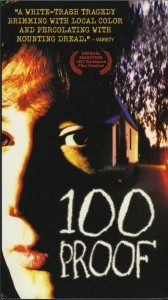 You don’t think about end credits. I mean, you really don’t think about end credits until you’re sitting with your producer and going back through every moment of the last two years, trying to remember the Key Grip, or name of the guy you called at 5:30pm on that Tuesday when you needed a dog who could bark on cue. Extras and bit parts, the caterer who cut you a deal, the Gaffer and the Best Boy, the two redneck pyro guys. “Special Thanks” to include all the people who put up with your bullshit for the last three years. There’s a deadline, so you walk to the fax machine with the sheets, and you stare at the empty line you left on the bottom of the page. You take a pencil and scribble in the last credit: “For my mother, with so much love.” You don’t think about end credits. I mean, you really don’t think about end credits until you’re sitting with your producer and going back through every moment of the last two years, trying to remember the Key Grip, or name of the guy you called at 5:30pm on that Tuesday when you needed a dog who could bark on cue. Extras and bit parts, the caterer who cut you a deal, the Gaffer and the Best Boy, the two redneck pyro guys. “Special Thanks” to include all the people who put up with your bullshit for the last three years. There’s a deadline, so you walk to the fax machine with the sheets, and you stare at the empty line you left on the bottom of the page. You take a pencil and scribble in the last credit: “For my mother, with so much love.”
Seven
Thirty minutes into our premiere, after I’d gone through my checklist of passive aggressive perfectionist asshole questions (Is the sound loud enough? Can you check the focus again? Is the projector bulb new?), Fred Mills, the gentleman manager of the Kentucky Theater, allows me sneak up to the old closed balcony and watch the movie from there. I stood overhead in the half-dark, studying the sides of faces, waiting to hear that little suck-in of breath when I knew the movie had them; when everyone was invisibly stuck together, taking a ride they weren’t expecting, not thinking about going to the bathroom, or fixing the rain gutters, or the fight they had on the way to the theater. Six years of my life for those 10 seconds? You betcha.*
* A month later, Fred tells me that the opening night crowd was total capacity–the first since the theater re-opened after the fire in 1987. The Kentucky sold more beer that week than ever before, and my friend David from high school fought a guy on Water Street who kept telling his buddies the movie sucked.
Eight
| The Final Tally |
|
|
| Budget |
$220,000 |
|
| On My Credit Cards |
$32,000 |
* |
| Girlfriends |
2 |
|
| Apartments |
3 |
|
| Friends Lost |
1 |
** |
| Cars (personal) |
2 |
|
| Cars (burned up) |
1 |
|
| Screenings (US) |
500+ |
*** |
| Reviews (major papers) |
12 |
|
| Reviews you claim to have not read, but of course you did |
12 |
|
| Times you walked into the Blockbuster on Euclid Ave. to see if your movie was rented |
0 |
**** |
| Pounds Gained |
25 |
|
| Filthy Oaths |
10,251 |
***** |
| Years |
6 |
|
| Days |
2190 |
|
| Days (Joy) |
2190 |
|
| Days (Sadness) |
2190 |
|
| Days (Regret) |
0 |
|
|
|
|
| * Estimate–I stopped counting at a certain point |
| ** Más vale solo que mal acompañado |
|
| *** Estimate, minus weird travelling tour of Australian outback |
| **** Ha ha ha ha (right….) |
|
| ***** Exact number |
|
|
Nine
She used to come by herself to the theater at night and stand in the back and watch the plays you directed. She told you stories about your grandfather who painted murals for the WPA, and that he died at age 45 behind the smokehouse where he would sit and sketch crows and fences. She wanted you to be a lawyer, but when you graduated high school, she bought you a correctable typewriter. She said, “Do what you want”, and the inflection was softly on the word “you”. She had colored her hair the day she visited the set, and you told her how good it looked. Later, after she had gone back home, you realized that it was a wig; that she now had to wear a wig. Your problems meant nothing.
Read the rest of…
Jeremy Horton: Rides and Murals, Dairy Bars and Balconies
|
The Recovering Politician Bookstore
|





![RickyFitts[1]](http://therecoveringpolitician.com/wp-content/uploads/2011/05/RickyFitts1-231x300.jpg)


















